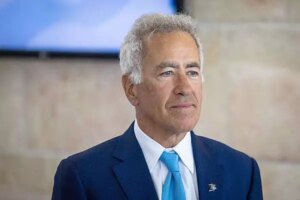
Tell an Israeli his or her invention idea is preposterous, and you’ve just given that inventor a reason to see it through.
Whether it was planting crops in the desert or building a crowdsourced navigation app, many groundbreaking Israeli innovations were initially dismissed as impossible – until bold action turned them into reality.
An educational culture that encourages questioning and independent thinking, and innovating on the fly, leads Israelis to read the word “impossible” as “I’m possible.”
And that leads to innovations that impact the entire world for the better.
“Israel’s impact in tech has become too broad to characterize by one invention or another,” says Saul Singer, coauthor of the 2009 bestseller Start-Up Nation: The Story of Israel’s Economic Miracle and the 2023 follow-up, The Genius of Israel: The Surprising Resilience of a Divided Nation in a Turbulent World.
“Nearly everything in our digital world, including the AI revolution, runs on Israeli technology. NVIDIA, for example, wouldn’t be where it is today if it hadn’t bought Melanox for $7 billion. The global CTO of NVIDIA is Israeli and is based in Israel. But it’s not just NVIDIA. Apple and Intel’s chips are largely designed in their large development centers here,” Singer tells ISRAEL21c.
“Without Israeli cybersecurity, the world’s largest companies and banks would lose their ‘Iron Dome.’ And this year, Iron Beam will be deployed, bringing the cost of shooting down drones and rockets from $50k to the price of a cup of coffee,” he continues.
“But it’s not just chips, cyber and defense. Today you could list many Israeli breakthroughs in healthcare bigger than PillCam [see below]. For example, AlphaTau uses darts that can dissolve any solid cancer tumor without touching healthy tissue. Healthy.io created the first FDA-approved urine test that you can do with your phone. InsightTec is treating tremors with noninvasive surgery using ultrasound.
“The list goes on in agritech, climatech and alternative proteins,” Singer says.
“Remilk, for example, is producing real milk without cows — and without the greenhouse gas emissions, massive land and water use, hormones, and ethical challenges that come from producing cow’s milk.”
Here are a dozen other amazing Israeli inventions once thought impossible.
Iron Dome
The Israeli defense establishment thought Brig. Gen. Daniel Gold had lost his mind in 2005 when he broached the idea for the mobile, all-weather missile-defense system that came to be known as Iron Dome.
Yet Gold forged ahead in blatant disregard of a Defense Ministry directive, quietly putting a team in place to build the system over the course of the two years it took to wrest official approval. In 2012, this former “Don Quixote” won the Israel Defense Prize for spearheading the Iron Dome project, which has been deflecting Hamas missiles fired from Gaza since 2012.
“I saw what was going on and I said to myself, with all the technology that exists in Israel, we must use it to protect human life. We will find a way,” he told ISRAEL21c. “It always takes the political and military echelons a long time to think about what they want to do, and in the meantime we started to create a solution.”
Growing crops in the desert
In 1959, Shai Ben Eliyahu and Hagai Porat had the ridiculous notion of founding an agricultural venture at Ein Yahav, a dusty army base in Israel’s Arava Desert.
A melon field in the Arava. Photo courtesy of KKL-JNF Photo Archive
“They were considered meshugenners, crazy people,” says Aylon Gadiel, former director of Southern Arava R&D, one of two research-and-development centers in the Arava.
“You couldn’t live in the Arava, let alone grow vegetables there. The Jewish Agency told them ‘No.’ So every Friday they went to the Tel Aviv headquarters of Mapai [Labor Party] and sat there until eventually David Ben-Gurion wrote them a letter.”
The founders dug a well to water a small vegetable garden, believing that the climate was perfect for veggies despite the arid soil.
“It was proven that it is possible, and one reason is the development of drip irrigation in the beginning of the 1960s,” says Gadiel. By 1967, the government was helping to build infrastructure, and in 1986 the Jewish Agency launched Arava R&D to develop cutting-edge agriculture and aquaculture technologies.
Today there are approximately 750 small farms throughout the once-deserted Arava, a 112-mile strip of land from the Dead Sea to the Red Sea. They produce vegetables, fruit, cut flowers and herbs for domestic sale and export.
According to Maayan Kitron, director of Central and Northern Arava R&D, some of the farms are now trying to cultivate apricots – another step on the Arava’s path from impossible to possible.
ReWalk
“The day I stood up, I knew I was about to cross the threshold from impossible to possible,” disabled US Army veteran Gene Laureano said in January 2013 when he strapped on the Israeli ReWalk robotic exoskeleton that enables people with lower-limb disabilities to walk.
Laureano’s “impossible” was also inventor Amit Goffer’s “impossible.” Larger and better-funded companies in other countries had long been trying to develop a similar device when Goffer made headlines in 2008 for inventing the world’s first commercially available upright walking technology. ReWalk became the most widely used and studied robotic exoskeleton, and the first available for personal ownership.
The recently introduced ReWalk 7 from Lifeward offers patients with spinal cord injuries a new level of independence with breakthrough technology for greater control, engagement and real-world mobility. Covered by Medicare in the United States, ReWalk 7 is the only personal exoskeleton that enables access to environments with stairs and curbs.
Goffer and colleagues worked on the groundbreaking invention for years before hitting the successful formula. He has said that in early meetings with potential marketing partners, “Many listeners did not believe me.” But ever since he was paralyzed in a 1997 accident, failure was never an option. “I know how it feels to sit in a wheelchair,” said Goffer of his determination to make the impossible possible.
Powermat
The idea for Powermat – a cord-free charging surface — was sparked by a 2006 conversation between entrepreneurs Ran Poliakine and Amir Ben-Shalom. Others had tried inventing such a device without success, but the men forged ahead even when potential partner companies declined to gamble on their idea.
“All of them said it was great, but nobody was willing to fire the first shot — to ‘cut the cables’ in favor of wireless,” Poliakine told ISRAEL21c. Eventually, a deal with Procter & Gamble (which owns Duracell) led to a series of wireless charging solutions for iPhones and other smartphones.
Today, Powermat is built into some 800 million smartphones, 40 million embedded accessories, and 8 million cars worldwide. The company provides wireless power solutions for IoT, telecom (5G), automotive, robotics, consumer electronics, medical devices, and industrial applications in partnership with 40 licensees including Samsung, General Motors, Flex, Harman International, Panasonic Automotive Systems, Pivotal Commware, Maytronics, Sportable and Kyocera.
PillCam
In 2001, when Gabriel Meron introduced a “pill” that takes images of the digestive system, everyone from consumers to doctors to technologists was astonished. It seemed that Meron and his company, Given Imaging, had brought to life the sci-fi flick Fantastic Voyage, using a tiny ingestible camera and transmitter instead of Raquel Welch. The invention was even featured on Ripley’s Believe it or Not.
“But as impossible as creating a successful video pill seemed to Meron and everyone but inventor Gabi Iddan, the ability to pull off all the other aspects of bringing the product to all the world’s major markets, with regulatory approval, in just three years may have seemed even more daunting,” notes Daniel Isenberg in his 2013 book Worthless, Impossible and Stupid: How Contrarian Entrepreneurs Create and Capture Extraordinary Value.
Today, PillCam products — marketed by Medtronic – are the global gold standard for “capsule endoscopy,” a category that did not exist before Meron and Iddan enabled the impossible.
Erasable computer memory
At the beginning of the 1970s, Israeli electrical engineer Dov Frohman invented a critical advance for personal computing: the EPROM (erasable programmable read-only memory), a chip that could retain its data when the power supply was switched off.
This first-ever erasable and reprogrammable chip won an Israel Prize for Frohman, who was among the founders of Intel, and it was responsible for Intel’s decision to establish a branch of the multinational company in Israel.
Since then, many other pioneering products have come out of Intel R&D labs in Israel, including the 8088, Pentium, Centrino (which enabled the world to use Wi-Fi), Sandy Bridge, Ivy Bridge and Thunderbolt, core Ips and many others.
Intel became the largest private employer in Israel’s high-tech sector, with three development centers (in Haifa, Petah Tikva and Jerusalem) and one manufacturing plant (in Kiryat Gat).
Waze
When the visionary founders of Waze proposed changing the paradigm of direction assistance for drivers, nobody thought it would take off – and certainly nobody thought that in a few short years Waze would be the world’s largest community-based traffic and navigation app.
The “crazy” idea that launched the crowdsourced app was to create a map from real-time users rather than basing directions on an existing static map. Waze thus revolutionized the way motorists reach their destinations.
Google bought Waze in 2013 for $1.03 billion, cementing the Israeli company as successful leader of a tech trend that has spawned about a dozen copycats.
TytoCare
Israeli dad Dedi Gilad wondered why it was impossible to have his sick preschooler’s ears checked without having to miss work and schlep a feverish kid to sit in a waiting room full of other germy children, only to spend five minutes with the pediatrician.
So in 2012, he and Ofer Tzadik founded TytoCare and spent nearly three years perfecting the technology and design of a home telemedicine kit that anyone can use to take their temperature and perform guided throat, ear, eye, skin, heart, lung, blood pressure and blood oxygen examinations of high enough quality to enable a remote diagnosis.
TytoCare’s suite of FDA-cleared products have been revolutionizing routine healthcare across the United States, with remote physical exam technology that delivers an in-clinic experience anywhere.
Mobileye
In 2000, when Mobileye cofounder Amnon Shashua began telling global carmakers his idea of combining a monocular camera, processor chips and software to produce affordable advanced driver-assistance systems (ADAS) and eventually self-driving cars, “the industry thought that this was not possible,” he told Automotive Engineering magazine.
It was commonly believed that ADAS would require expensive radar sensors, or at the very least two cameras for stereo vision. The Hebrew University of Jerusalem professor of computer science proved the industry wrong and was named a Mobility Innovator by the Automotive Hall of Fame in 2022.
The Mobileye team took a radical and risky decision to design a full System-on-Chip, EyeQ, that could do the job as Shashua envisioned.
In 2024, Mobileye marked the shipment of the 200 millionth EyeQ system, now in its sixth iteration as part of the Surround ADAS platform. Mobileye’s SuperVision, Mobileye Chauffeur and Mobileye Drive systems cover combustion and electric vehicle models. The Jerusalem-based company works with major carmakers such as Audi, BMW, Chery, Ford, GM, Honda, Nissan, Toyota and Volkswagen.
NaNose Medical
NaNose Medical is developing a portable Dianose sensor that analyzes breath samples using advanced nanotechnology and AI to “sniff out” biomarkers for metabolic dysfunction-associated steatotic liver disease (MSLD, previously known as non-alcoholic fatty liver disease) or lung cancer in early stages.
“Our dream is that it will be used by every primary care physician at the point of care,” says cofounder and COO Ilay Marom.
The technology was developed over a decade by Technion Prof. Hossam Haick. Haick was determined to accomplish the seemingly impossible: making an affordable diagnostic device as sensitive to disease as a dog’s nose.
Nanose Medical, founded five years ago, has collected data from trials at nine hospitals and is working toward commercializing its screening tool for MASLD in 2026.
The company recently took part in the NVIDIA Inception program to advance its R&D efforts and expand its network within the tech and healthcare communities.
Quantum Machines
Quantum Machines, founded in 2018, specializes in complete hardware and software solutions to achieve “quantum control” — manipulating quantum mechanics technology to fit the desired goals of computing researchers in complex fields like cryptography and machine learning.
The company recently introduced Hybrid Control, “a revolutionary new approach for quantum developers to effortlessly achieve their ambitious milestones – previously impossible.”
Quantum Machines was included by Gartner Research Group on its Cool Vendors in Quantum Computing list in 2020.
Pre-Cure
Creating an affordable 3D-printed tumor-on-a-chip, scalable for wide usage as a testing ground for personalized cancer treatment, is the previously impossible feat performed by Ofra Benny, an award-winning professor of pharmaceutical sciences at the Hebrew University of Jerusalem.
Earlier models didn’t give accurate results and depended on expensive pumps. Benny’s innovation was a pumpless chip based on gravity.
“Currently, cancer treatments are chosen based on general criteria, without important personal information. As a result, many patients receive ineffective treatments and develop resistance,” said Benny.
“There is a need for accurate, non-animal prediction models that mimic the body’s physiology, so we’ve developed Pre-Cure, a groundbreaking cancer diagnostic platform using a unique 3D-printed biochip that creates a precise tumor environment using the patient’s own tissues. This helps in selecting the right therapy and testing drug responses.”
Pre-Cure, founded in 2024 through the university’s Yissum tech-transfer company, is currently doing six clinical trials on different cancer indications.
“I believe by the end of the year [2025] we’ll release our first tests, which will be for ovarian cancer patients,” Pre-Cure CEO Dan Simhon tells ISRAEL21c.





